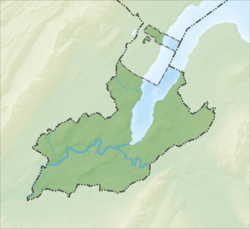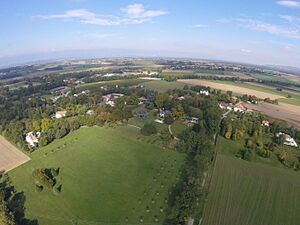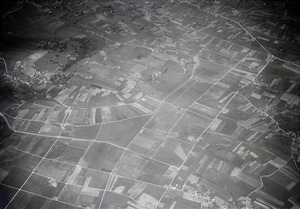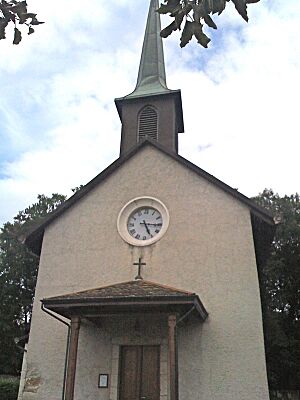Presinge facts for kids
Quick facts for kids
Presinge
|
||
|---|---|---|
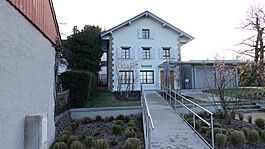 |
||
|
||
| Country | Switzerland | |
| Canton | Geneva | |
| District | n.a. | |
| Area | ||
| • Total | 4.71 km2 (1.82 sq mi) | |
| Elevation | 460 m (1,510 ft) | |
| Population
(Dec 2020 )
|
||
| • Total | 696 | |
| • Density | 147.77/km2 (382.7/sq mi) | |
| Postal code |
1243
|
|
| Surrounded by | Choulex, Jussy, Juvigny (FR-74), Meinier, Puplinge, Ville-la-Grand (FR-74) | |
Presinge is a municipality (a type of town) in the canton of Geneva, Switzerland. It is a charming place with a rich history and beautiful natural surroundings.
Contents
History of Presinge
Presinge was first mentioned in records around the year 1000. Back then, it was called in Presiago. Later, in 1180, it was known as villa que appellatur Presingium.
The village of Presinge was once part of an old kingdom called Burgundy. Around 443 AD, a Germanic group of people called the 'Burgondes' settled here. Many nearby villages, like Puplinge and Corsinge, have names that sound German, even though they are now spelled in French. This suggests that the area was once mostly settled by Germanic people.
A noble family, known as Presinge or Pressinge, gave their name to the village. Over many centuries, their influence and numbers slowly decreased.
You can find an old map from 1740 by Philippe Bauche that shows the older spelling, "Pressinge." The original map is kept safe in the Bibliothèque de Genève (Geneva Library).
Geography of Presinge
Presinge covers an area of about 4.72 square kilometers (1.82 square miles). A large part of this land, about 67.8%, is used for farming. Forests cover about 18.6% of the area.
Around 12.9% of Presinge is built up with buildings and roads. A small part, 0.4%, is made up of rivers or lakes. The remaining 0.2% is land that cannot be used for farming or building.
Most of the built-up area (8.5%) is for homes and other buildings. Roads and other transport areas make up 3.4%. In the forested areas, 16.3% is dense forest, and 2.3% has orchards or small groups of trees. For farming, 54.0% is used for growing crops, 6.6% for pastures, and 7.2% for orchards or vineyards. All the water in Presinge is from flowing rivers or streams.
Presinge includes the main village of Presinge and smaller communities called hamlets. These hamlets are Cara, L'Abbaye, La Renfile, and La Louvière.
Population and People
Presinge has a population of about 658 people (as of 2022). In 2008, about 16.3% of the people living in Presinge were foreign nationals. Over ten years (1999–2009), the population grew by 7.8%. This growth was mainly due to people moving into the area (32.1%), while births and deaths caused a decrease of 22%.
Most people in Presinge speak French. In 2000, about 84.7% of the population spoke French. The second most common language was Albanian (3.6%), followed by German (2.4%). A small number of people also spoke Italian.
In 2008, about 47% of the population was male and 53% was female. Many people (about 33.7%) were born in the same canton (Geneva). About 20.2% of the population was born outside of Switzerland.
Family Life and Homes
In 2000, there were 184 private homes in Presinge, with an average of 2.6 people living in each. About 26.9% of homes had just one person. There were also homes with married couples (with or without children) and single parents.
Most of the buildings in Presinge are single-family homes. In 2000, 62.4% of the inhabited buildings were single-family homes. Many of these older homes were built before 1919. There are also some multi-family buildings and buildings used for both homes and businesses.
In 2000, there were 194 apartments in Presinge. The most common size was 3 rooms. Most apartments (87.6%) were lived in all the time. A small number were used seasonally (7.7%) or were empty (4.6%).
Economy and Jobs
In 2010, Presinge had an unemployment rate of 4.8%. This means that 4.8% of people who wanted to work could not find a job.
The economy of Presinge is divided into three main parts:
- Primary sector: This includes jobs related to natural resources, like farming. In 2008, 25 people worked in this sector, mostly in agriculture.
- Secondary sector: This involves making things, like in factories or construction. In 2008, 5 people worked in this sector, mainly in construction.
- Tertiary sector: This includes jobs that provide services, like doctors, teachers, or people who work in shops. In 2008, 158 people worked in this sector. Many worked in healthcare (52.9%), or as technical experts and scientists (15.4%).
Many people who live in Presinge travel to other towns for work. In 2000, 181 people commuted out of Presinge for their jobs. About 21.4% of the people who came to work in Presinge were from outside Switzerland. Most people (64.7%) used a private car to get to work, while 11.5% used public transportation.
Religion in Presinge
According to the 2000 census, many people in Presinge are Roman Catholic (36.5%). Another large group (22.6%) belonged to the Swiss Reformed Church.
A small number of people belonged to other Christian churches, including Orthodox and Christian Catholic churches. There were also a few people who were Jewish or Islamic. About 19.22% of the population said they did not belong to any church, or were agnostic or atheist.
Education in Presinge
Education is very important in Presinge. About 24.6% of the population has finished non-mandatory high school education. Also, 21.7% have completed higher education, like attending a university or a specialized college (Fachhochschule).
The education system in the Canton of Geneva allows young children to attend two years of non-obligatory Kindergarten. After that, students must attend six years of primary school. Some children might go to smaller, specialized classes if needed.
The secondary school program has three required years, followed by three to five years of optional advanced schooling. In the 2009-2010 school year, there were 126 students in the Presinge school system. This included students in pre-kindergarten, primary school, and lower secondary school. Many students from Presinge also attended schools outside the municipality.
See also
 In Spanish: Presinge para niños
In Spanish: Presinge para niños




